An Apple 40th birthday reflection

Summer 1984, Chapel Hill, N.C., I learned something about prejudice and discrimination in America and saw my first Macintosh. Strangely, looking back at Apple, which celebrates its 40th birthday today, the two things connect.
As I reflected in Jan. 18, 2004, personal post: "Racism and Naiveté", I never thought much about skin color growing up in a region of America where most everyone is Caucasian. Northern Maine is a white wonderland for more than abundant snowfall. Strangely, though, my best friends had last names like Chung and Zivic. The local Air Force base, Loring, added color to the populace, and when it came to people I was decidedly colorblind.
Master & Dynamic MH40 headphones [review]

Newcomer is the only way to describe Master & Dynamic, which on Dec. 31, 2015 completed its first full year of revenue. Young or not, its audio gear is vintage and refined. Wanna see? You can find the MH40 headphones, which look like something World War II bomber pilots would wear, inside any Apple Store. Distribution partnership of that caliber from a near start-up says much about M&D earphones and headphones—design, price, and sound.
The signature sound is full, which is atypical in a market where booming bass ranks among headphone buyers’ top priorities. But for those listeners who delight in the faintest tap of the symbol, warmest treble, and deep lows that reveal details rather than thump, thump, Master & Dynamic delivers. For Christmas I bought the company’s MW60 wireless headphones, which I will review soon. Today's topic is the MH40, which are wired.
Apple iPad scheme seeks to reclaim the tablet market and win the post-PC wars

Something surely seems missing from this week's Apple Event. A year ago this month, Apple introduced the svelte, 12-inch MacBook. That makes the little laptop ripe for refresh, but it is MIA. Following a media hoopla where the figurative fireworks failed to light, everyone should ask: What is Apple doing? The new 4-inch iPhone is little more than the 5 model introduced in 2012 with fresh internals. The 9.7-inch iPad Pro fits into a crowded category where Apple is mob in the room. Where's the innovation?
After watching the live stream, carefully reviewing what Apple executives said, and looking over device sales trends, I must say this: Either Tim Cook is stupidest tech CEO on the planet, or one of the smartest. The event's big takeaway is this: Apple is trying to corner a faltering computing category on the presumption it's the next big thing. Cook takes great risk in search of greater rewards. If he's right, Apple may come to dominate the next personal computing platform—even as Android armies spread across the planet. Everything hinges on these: Will tablets replace PCs and can Apple become the overwhelming market share leader, regaining dominance held six years ago?
Sizing Up Google Pixel C [Review]
If you're thinking about buying Pixel C, Google gives two good reasons to do so now: Android N beta program and developer discount on the hardware. The tablet normally sells for $499 (32GB) or $599 (64GB) but you could instead pay $375 or $449, respectively. Keyboard is another $149. The discount and beta OS are meant for developers, but anyone can get them.
Pixel C is the best Android tablet I have ever tested, but that's acknowledging prejudice against Samsung tabs, which are worthy contenders, but I dislike TouchWiz UI. Sammy's hardware hums, particularly the stunning screens. But only Google serves up a Marshmallow feast in Android 6.0, and the hardware design and construction are preemo to the max. For less than $400, Pixel C might as well be free, there is so much value here.
Microsoft stands with Apple against the FBI

Microsoft will join Apple against the FBI and U.S. Justice Department, filing a friend-of-court—or amicus—brief in a case going to court tomorrow. The government wants Apple to create a special version of iOS, referred to by critics as FBIOS, to break into an iPhone 5c security feature. The device manufacturer argues that compliance would set a precedent that would give law enforcement carte blanche with other mobile devices.
Brad Smith, Microsoft's chief legal counsel, says the company "wholeheartedly supports Apple"—a statement that eradicates any potential confusion caused by cofounder Bill Gates. In an interview with Financial Times two days ago, Gates supported the government's demands. I responded, calling his position a "catastrophic occurrence that demands current chief executive Satya Nadella's official response. There needs to be clear policy about government backdoors and the position with respect to the San Bernardino shooting iPhone". The company's position is now unequivocally clear—presuming the legal filing fits with "wholeheartedly".
My journey from iPad Pro lemon to Apple lemonade [sixth in a series]

My previous post in this series begins: "I cannot presently recommend Apple's big-ass tablet as a laptop replacement—using the official-issue Smart Keyboard". The statement is retracted.
Apple PR contacted me after the story published, asserting that the short battery life I experienced was abnormal behavior. Seeing as it was the last day to return iPad Pro under T-Mobile's buyer's remorse policy, I took the assertion at face value and returned the rig. The exchange interrupted my plans to use the tablet as my primary PC for a month. From today, the clock resets to zero, and I start over.
Bill Gates is wrong

I see something disingenuous about Microsoft cofounder Bill Gates supporting the government's demands that Apple selectively unlock an iPhone used by one of the San Bernardino, Calif. shooters. The former CEO turned philanthropist spoke to the Financial times in an interview posted today. The implications for Microsoft cannot be overstated, and the company's current chief executive should state corporate policy.
Gates' position aligns with the government's: That this case is specific, and isolated, and that the demand would merely provide "access to information". Here's the thing: The interviewer asks Gates if he supports tech companies providing backdoors to their smartphones. The technologist deflects: "Nobody's talking about a backdoor". Media consultants teach publicly-facing officials to offer non-answers exactly like this one. The answer defines the narrative, not the interviewer's question.
Tim Cook is absolutely right
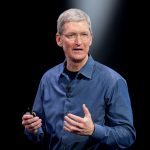
Some documents are historically significant. They mark moments, comment on them, in manner demanding future citation and even use in courts or classrooms. That's how I read Apple CEO Tim Cook's "Open Letter to Our Customers", about breaking iPhone encryption. His exposition spotlights seminal moment in the United States of America: Government's further expansion of powers encroaching indiviuals' rights to privacy and one company standing up and saying "No".
Some people will scoff at my comparison, but it truly is what I see. Cook is like Rosa Parks, refusing to take a seat at the back of the bus—or in this instance behind one court judge and the FBI. Cook and Apple stand up for us all. I applaud law enforcement's efforts to protect us from terrorism but tyranny shouldn't be the means; taking away Constitutionally-given freedoms to protect them. Tim Cook is right.
Google 'Monotune' is goddamn good metaphor marketing

Great advertising strikes a chord, in this instance quite literally, with consumers. The best compares the primary product to another, effectively evoking emotional connection. Apple's "1984" commercial and "Get a Mac" series are excellent examples. In the former, the IBM PC is portrayed as Big Brother, while in the latter actors represent Mac and PC—the benefits of one and detriments of the other. Both examples use metaphors to simplify complex comparisons and to make lasting impressions rather than to checklist features.
Google spot "Monotune" is a magnificent metaphor—piano of 88 different keys representing Android set against another, portraying iPhone, where all the notes are the same. Music is memorable, and the comparison striking as much for the under current. Apple's brand often is associated with music and also creative individuals.
iPad Pro's fatal flaw? [fifth in a series]
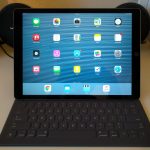
Editor's Note: Apple contacted me on February 16th, suggesting the short battery life is abnormal. We discussed tech support option but I chose instead to replace the whole kit—iPad Pro and keyboard—to see if the short battery life with Smart Keyboard is a one-off hardware problem.
The follow-up post, on February 24th, countermands the negative conclusions stated in this review. Battery life from the second kit is hugely satisfying and plenty long enough for the typical workday. The user experiences aren't comparable. I debated about deleting the original story but that feels like hiding something. Hopefully this addendum sufficiently retracts the original conclusion.
What I like about Apple iPad Pro [fourth in a series]
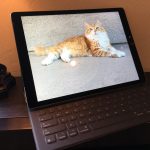
Day 10, and it's difficult to wonder where nearly two weeks went. Yet here I am with iPad Pro, and more settled than last weekend, when griping about how the tablet frustrates me.
I want to start by discussing Apple's Smart Keyboard, which is a $169 accessory that I recommend for everyone who doesn't plan on using fingers and Pencil as primary, ah, utensils. Typing is amazingly smooth and accurate. The keys present terrific travel, without requiring too much force while still giving plenty of tactile response. Shocked best describes my reaction to the experience. Sometimes what's missing brings something more: Ommission of the trackpad, which either is brilliant conception or Apple chief designer Jony Ive and team getting goddamn lucky.
What I Don't Like About Apple iPad Pro [third in a series]
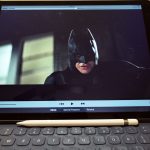
Day 5 morning, and I am close to returning the iPad Pro to T-Mobile. There are too many quirks that reaffirm my contention in this series' second post: Apple's big-ass tablet is a proof-of-concept device that's ready, or so I thought, for few users (digital content creators) but not the masses. Now I wonder if the thang is ready for anyone.
Setting up Apple Pencil should be as easy as pulling off the rear cap, inserting into Lightning port, and acknowledging Bluetooth connect request prompt. But there is no response from the tablet, after a half-dozen attempts, so I Google for solutions. No luck there, and I check Bluetooth settings, where the device doesn't appear. Disconnect my Harman Kardon speakers. No change. Turn off and on Bluetooth. Nope. Detach Pencil, try again. Success! Device shows up, pairs, then disconnects, and stays that way until I try again, and then it's "Groundhog Day" time. I'm Bill Murray reliving the same moment over and over without progress.
Is Apple iPad Pro too big? [second in a series]
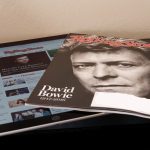
"Look up, waaaaaay up" is a phrase familiar to Canadians of a certain age, who watched "The Friendly Giant". The kids program aired from 1958 to 1985 on CBC, which our TV antenna grabbed from the local affiliate across the border in New Brunswick (I'm from Northern Maine). There's something about iPad Pro's enormity that makes it feel more like something the Giant would use.
My question this fine Friday: Is iPad Pro too big? For the majority of potential buyers, my answer is unequivocally yes. I don't see a product made for the majority. Whatever Apple's post-PC ambitions, iPad Pro is more a proof-of-concept for future laptop replacement. However, for the few -- creators looking for larger digital canvas -- iPad Pro offers much. For the many, the first version will work out the kinks, such as getting the app platform placed, for mass-market successors. Warning: Embracing the expansive tablet may make switching to something smaller nearly impossible. Size matters, and sometimes larger is better.
Hell, yeah, Amazon should open more bookstores
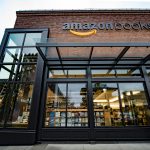
There is collective head-scratching across the InterWebs about a Wall Street Journal report that Amazon will open as many as 300, or even 400, stores selling books. The company's massive success selling ebooks and the cost and selection advantages of warehousing their physical counterparts make the concept seem nonsensical. I contend that it's brilliant.
Amazon is in process of expanding online services into the purview of local retail, which biggest competitive advantage is immediacy. In conjunction with the $99-per-year Prime program, the online retailer offers faster shipping; same day, and within hours, in some locales. The company increasingly contracts its own carriers, as well. Immediacy requires presence. What better location than a bookstore that also warehouses other goods and provides customer service operations? That's all without considering the branding opportunities, which, as Apple Store demonstrates, can be huge.
My Apple iPad Pro adventure begins [first in a series]
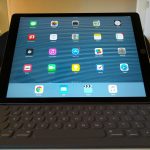
The first thing you notice about iPad Pro is the size. The tablet is ginormous. Its 12.9-inch screen lays before you like a chalk slate -- a blank canvas demanding typed text or drawings made with Apple Pencil. Yet something also feels wrong about the thing. During the so-called Steve Jobs era, refined designs were smaller -- like iPod nano. Apple is no stranger to larger; 27-inch iMac today or 17-inch MacBook Pro of yesteryear are examples. Perhaps. But there's big, and BIG.
The giant tablet arrived around 2:50 p.m. PST on Groundhog Day 2016, marking a bold computing adventure for February: Using iPad Pro as my primary PC, and hopefully only one. Perhaps you read my recent obituary to Apple love lost and might wonder why buy anything Apple? I like to experiment and am paid to try out new things (so you won't have to). By sheer size, PC replacement -- not companion -- is the only sensible use for iPad Pro. Can it meet the demands? I want to find out.
Joe's Bio
Joe Wilcox is BetaNews executive editor. His motto: Change the rules. Joe is a former CNET News staff writer, JupiterResearch senior analyst, and Ziff Davis Enterprise Microsoft Watch editor.
Ethics StatementBetaNews, your source for breaking tech news, reviews, and in-depth reporting since 1998.
© 1998-2025 BetaNews, Inc. All Rights Reserved. About Us - Privacy Policy - Cookie Policy - Sitemap.
